LESSON GOAL
In this lesson, you will learn expressions that can be used when asking and giving directions.
DESCRIBING A PICTURE
Please study the picture below. Then, I will ask you some questions.
DESCRIBE
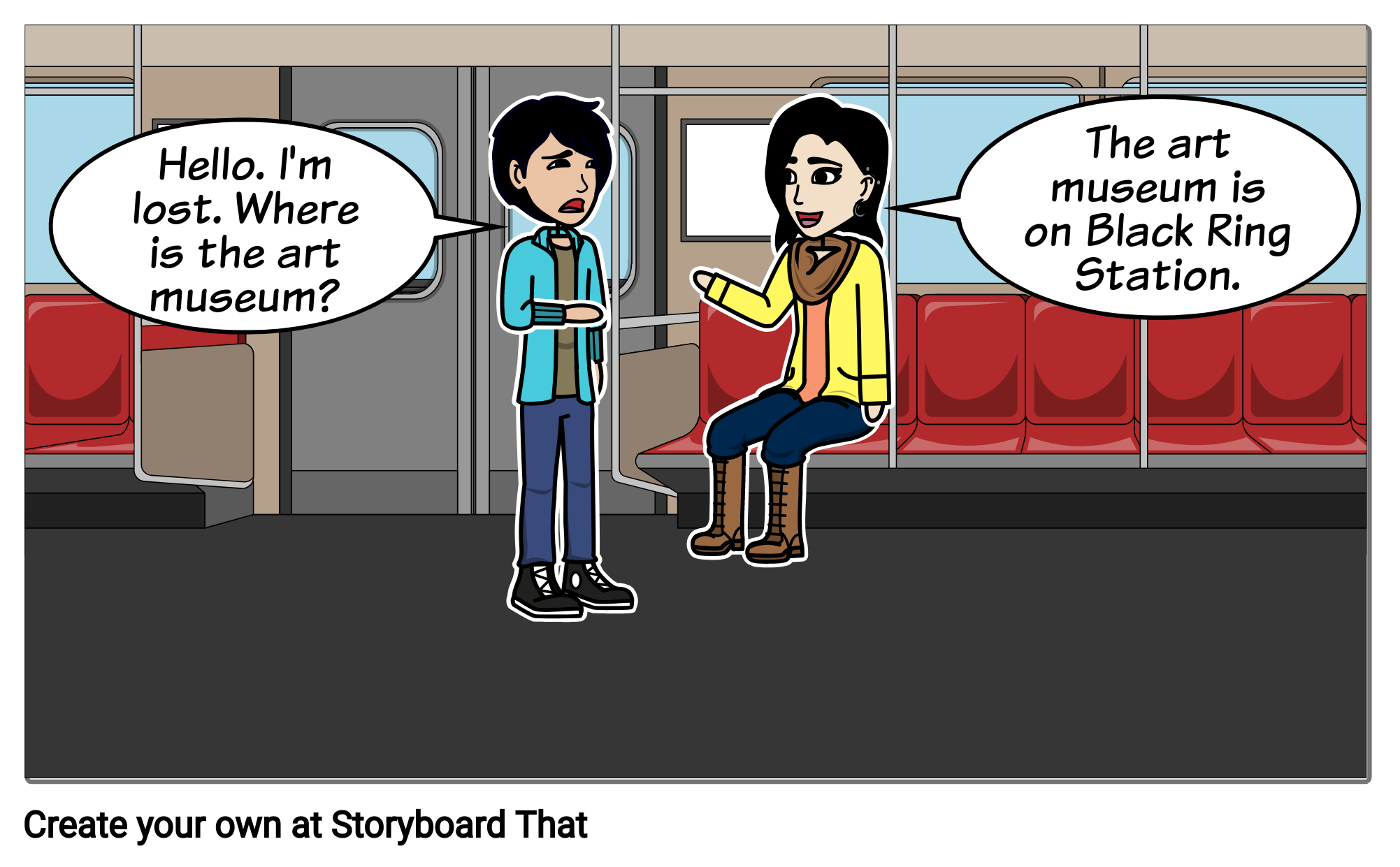
| 1. | Where is the man going? |
| Answer: | |
| 2. | Where is the art museum located? |
| Answer: |
REVIEW
Now, let us review your answers.
(Please review your student’s answers by sending the correct answers in complete sentences. After that, ask your student to read aloud his or her corrected answers.)
USEFUL EXPRESSIONS
Now, let us read aloud the following sentences. Please repeat after me.
READ
| 1. | Do you know where ~? |
| 2. | You may go to ~ |
| 3. | How far is ~? |
| 4. | Drop you off. |
| 5. | On my way. |
READING ALOUD
Let us read the dialogue. I will play the Tourist and you will play the Local. After reading it once, we’ll switch roles.
READ
| Tourist: | Good afternoon, miss. Do you know where I can find Dante’s Pizza House? I’m afraid I’m lost. | |
| Local: | Dante’s Pizza House has a lot of branches here in Rome. They serve the best pizza in our country. Which branch of Dante’s Pizza House are you looking for? | |
| Tourist: | My friends messaged me the branch and it’s near the Trevi Fountain. How far is it from here in St. Peter’s Basilica? | |
| Local: | Oh, it’s not that far from here. From St. Peter’s Basilica, you may go to Trevi Fountain by foot. It’ll take about 30 minutes. It’s also a nice way for sightseeing. | |
| Tourist: | I guess I’ll just go to Dante’s Pizza House by foot since I still have plenty of time. Just in case, can I ride a taxi from here to Dante’s Pizza House? | |
| Local: | Yes, just tell the driver to drop you off at the Trevi Fountain. Dante’s Pizza House is just across it. | |
| Tourist: | Okay. I’ll take note of that. Thank you. I’ll be on my way. | |
| Local: | You’re welcome and enjoy! |
CHECK YOUR UNDERSTANDING
Please answer the questions based on the dialogue.
ANSWER
| 1. | Where is the tourist going? |
| Answer: | |
| 2. | How many minutes will it take from St. Peter’s Basilica to Trevi Fountain by foot? |
| Answer: |
REVIEW
Now, let us review your answers.
(Please review your student’s answers by sending the correct answers in complete sentences. After that, ask your student to read aloud his or her corrected answers.)
GUESS THE MEANING
Choose the correct meaning of the underlined word in each sentence. Choose the correct answers from the box below.
ANSWER
| 1. | My cousin and his wife will spend their honeymoon on a cruise. |
| a. | riding on a bus to travel from several places. |
| b. | riding on a plane to go from one place to another. |
| c. | travelling on a large ship for pleasure and/or vacation purposes. |
| 2. | The government complex is not far from here. |
| a. | a backyard |
| b. | a road |
| c. | a group of buildings |
| 3. | Maya will hit the road tonight to avoid traffic. |
| a. | to leave |
| b. | to sleep |
| c. | to stay |
REVIEW
Now, let us review your answers.
(Please review your student’s answers by sending the correct answers in complete sentences. After that, ask your student to read aloud his or her corrected answers.)
CONVERSATION PRACTICE
Now, I will ask you some questions. Please answer in complete sentences.
ANSWER
| 1. | Have you ever been lost while traveling? |
| Answer: | |
| 2. | Who do you ask for directions when you are lost? |
| Answer: | |
| 3. | Do you rely on your gadgets (e.g. phone) to when looking for directions? |
| Answer: |
CONVERSATION PRACTICE
Now, you will ask me questions. Please ask me questions using the items given.
ANSWER
| 1. | travel alone or with others |
| Tutor’s answer: | |
| 2. | latest vacation trip |
| Tutor’s answer: | |
| 3. | lost while traveling |
| Tutor’s answer: |
REVIEW
Now, let us review your answers.
(Please review your student’s answers by sending the correct answers in complete sentences. After that, ask your student to read aloud his or her corrected answers.)
REVIEW AND FEEDBACK
Now, let us review the things that you learned in this lesson.
(Please give a short feedback on how your student did on your class.)
| Grammar | Pronunciation | Vocabulary | Comprehension | |
|---|---|---|---|---|
 GOOD GOOD |
Was able to speak in complete sentences with minimal grammatical errors. | Was able to pronounce most of the words clearly and correctly. | Used appropriate expressions learned in class. | Was able to understand the passages and answer the questions correctly. |
 FAIR |
Was able to speak in complete sentences with evident grammatical errors. | Mispronounced a few words. | Used appropriate expressions learned in class and made a few errors in word choice. | Had a little difficulty in understanding passages and answering questions. |
 POOR |
Was able to speak using words only. | Mispronounced most of the words. | Used only a few words and expressions. | Had a hard time understanding passages and answering questions. |
Travel Intermediate – Sightseeing
LESSON GOAL
In this lesson, you will learn expressions that can be used when sightseeing.
DESCRIBING A PICTURE
Please study the picture below. Then, I will ask you some questions.
DESCRIBE
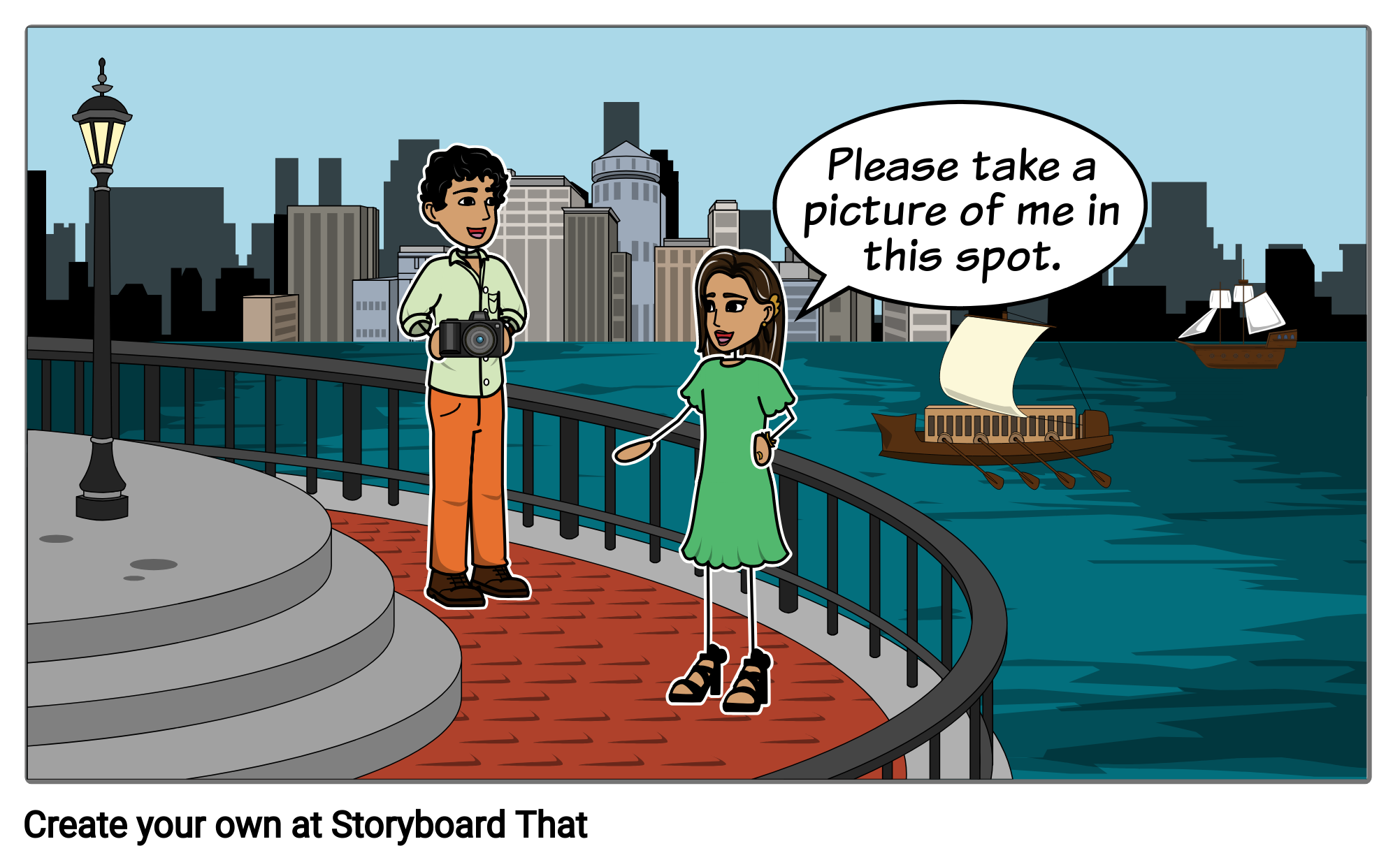
| 1. | What are they doing? |
| Answer: | |
| 2. | Who will take the woman’s picture? |
| Answer: |
REVIEW
Now, let us review your answers.
(Please review your student’s answers by sending the correct answers in complete sentences. After that, ask your student to read aloud his or her corrected answers.)
USEFUL EXPRESSIONS
Now, let us read aloud the following sentences. Please repeat after me.
READ
| 1. | What places do you recommend? |
| 2. | I recommend ~ |
| 3. | How much is the admission fee? |
| 4. | The admission fee is ~ |
| 5. | Could you take a photo of me? |
| 6. | Sure, no problem! |
READING ALOUD
Let us read the dialogue. I will play David and you will play Emma. After reading it once, we’ll switch roles.
READ
| David: | Good morning, Emma. How’s your first day here in the Philippines? | |
| Emma: | Good morning, David. It’s okay. I want to go sightseeing today. What places do you recommend? | |
| David: | I recommend visiting Manila Bay and Rizal Park. The best time to visit these places is in the afternoon so that you can watch the sunset. I can tour you around if you want. | |
| Emma: | Really? That’s very nice of you. By the way, your friend told me that there’s an art gallery nearby. How much is the admission fee? | |
| David: | The admission fee is one dollar. However, the art gallery is closed today, but you can visit it tomorrow. It will be open from 10 a.m. to 4 p.m. | |
| Emma: | Okay. Could you take photos of me while we tour around? I’d like to show it to my parents. They’re in Japan. | |
| David: | Sure, no problem! By the way, we have to ride a jeepney to go to Manila. It’s our country’s common means of transportation. | |
| Emma: | Okay. I’ve seen jeepneys on my way here yesterday and I can’t wait to ride one. |
CHECK YOUR UNDERSTANDING
Please answer the questions based on the dialogue.
ANSWER
| 1. | What are the two places that David recommends Emma to visit? |
| Answer: | |
| 2. | How much is the art gallery’s admission fee? |
| Answer: |
REVIEW
Now, let us review your answers.
(Please review your student’s answers by sending the correct answers in complete sentences. After that, ask your student to read aloud his or her corrected answers.)
FILL IN THE BLANKS
Let us complete following sentences. Choose the correct answers from the box below.
ANSWER
| visit | admission fee | recommend | transportation |
| 1. | Train is one of the most common means of __________. |
| 2. | I __________ that you go to Universal Studios Japan in October. |
| 3. | How much is the __________ at the park? |
| 4. | Which place do you want to __________ tomorrow? |
REVIEW
Now, let us review your answers.
(Please review your student’s answers by sending the correct answers in complete sentences. After that, ask your student to read aloud his or her corrected answers.)
CONVERSATION PRACTICE
Now, I will ask you some questions. Please answer in complete sentences.
ANSWER
| 1. | What are the most famous sightseeing spots in your country? |
| Answer: | |
| 2. | What do you think is the most interesting place in the world? |
| Answer: | |
| 3. | Which do you prefer, sightseeing in your own country or abroad? |
| Answer: |
CONVERSATION PRACTICE
Now, you will ask me questions. Please ask me questions using the items given.
ANSWER
| 1. | sightseeing spots in the Philippines |
| Tutor’s answer: | |
| 2. | place/s you want to visit |
| Tutor’s answer: |
REVIEW
Now, let us review your answers.
(Please review your student’s answers by sending the correct answers in complete sentences. After that, ask your student to read aloud his or her corrected answers.)
REVIEW AND FEEDBACK
Now, let us review the things that you learned in this lesson.
(Please give a short feedback on how your student did on your class.)
| Grammar | Pronunciation | Vocabulary | Comprehension | |
|---|---|---|---|---|
 GOOD GOOD |
Was able to speak in complete sentences with minimal grammatical errors. | Was able to pronounce most of the words clearly and correctly. | Used appropriate expressions learned in class. | Was able to understand the passages and answer the questions correctly. |
 FAIR |
Was able to speak in complete sentences with evident grammatical errors. | Mispronounced a few words. | Used appropriate expressions learned in class and made a few errors in word choice. | Had a little difficulty in understanding passages and answering questions. |
 POOR |
Was able to speak using words only. | Mispronounced most of the words. | Used only a few words and expressions. | Had a hard time understanding passages and answering questions. |
Travel Beginner -Traveling
LESSON GOAL
In this lesson, you will learn expressions that can be used when talking about traveling.
このレッスンでは、旅行について話すときに使える表現を学びます。
DESCRIBING A PICTURE
Please study the picture below. Then, I will ask you some questions.
イラストを見てださい。講師がイラストについて質問します。
DESCRIBE
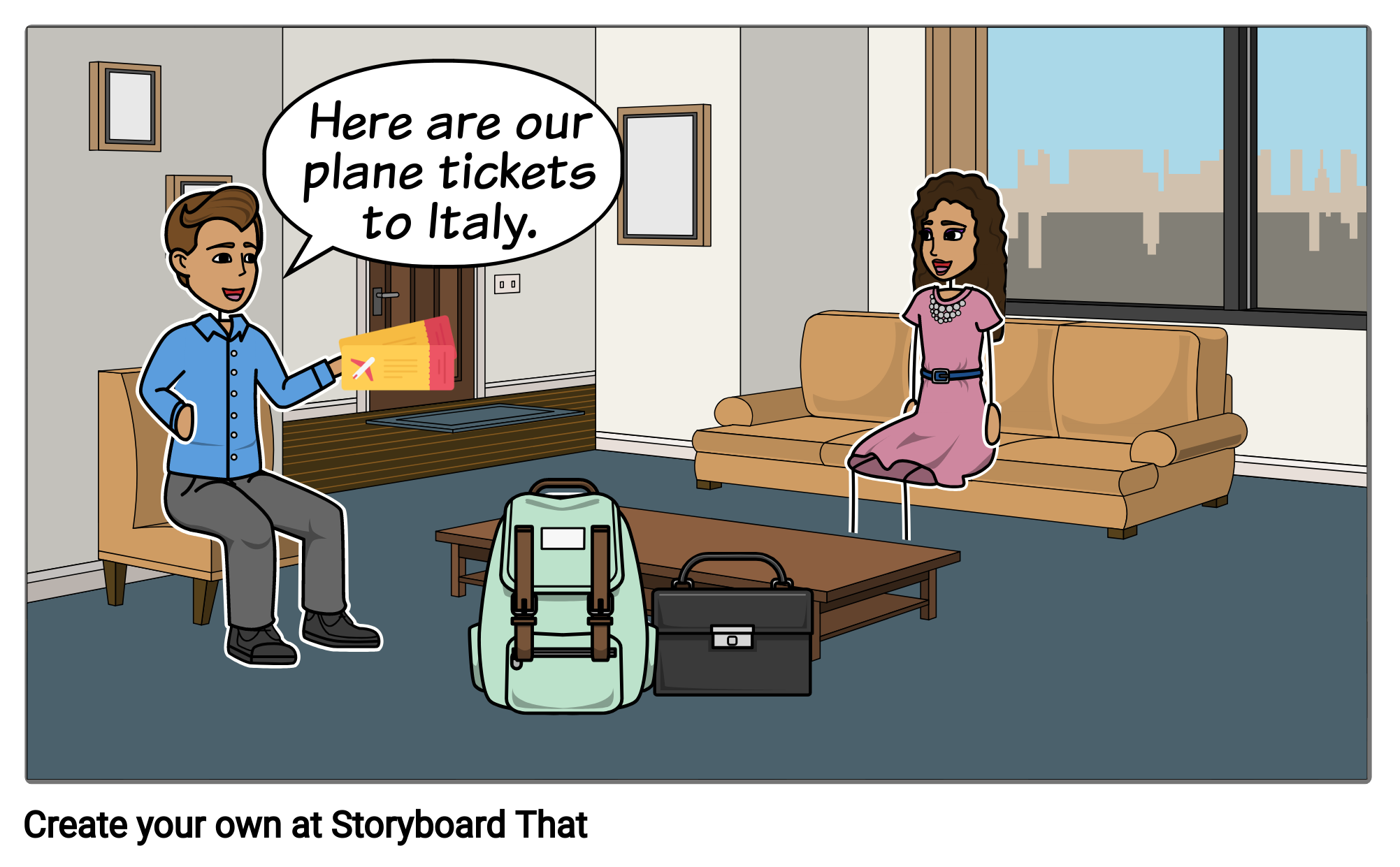
| 1. | How many people are there? |
| Answer: | |
| 2. | Where are they going? |
| Answer: |
REVIEW
Now, let us review your answers.
では、あなたの答えを復習してみましょう。その後、修正したあなたの答えを読んでみましょう。
(Please review your student’s answers by sending the correct answers in complete sentences. After that, ask your student to read aloud his or her corrected answers.)
USEFUL EXPRESSIONS
Now, let us read aloud the following sentences. Please repeat after me.
次に文章を音読しましょう。講師につづいて読みましょう。
READ
| 1. | My flight is on ~ | |
| 2. | What places will you visit in ~ | |
| 3. | I will visit ~ |
READING ALOUD
Let us read the dialogue. I will play Rose and you will play Ron. After reading it once, we’ll switch roles.
会話文を読みましょう。最初に講師がRose、あなたがRonの部分を読みます。終わったら交代しましょう。
READ
| Rose: | Hi, Ron. I heard that you are going to Italy. When is your flight? | |
| Ron: | Hi, Rose. My flight is on October 14. | |
| Rose: | I see. What places will you visit in Italy? | |
| Ron: | I will visit Rome and Venice. I’m really excited! | |
| Rose: | That is amazing! How much is the plane ticket? | |
| Ron: | It costs about $800. |
CHECK YOUR UNDERSTANDING
Please answer the questions based on the dialogue.
会話文に関する質問に答えましょう。
ANSWER
| 1. | Where is Ron going? |
| Answer: | |
| 2. | How much is the plane ticket? |
| Answer: |
REVIEW
Now, let us review your answers.
では、あなたの答えを復習してみましょう。その後、修正したあなたの答えを読んでみましょう。
(Please review your student’s answers by sending the correct answers in complete sentences. After that, ask your student to read aloud his or her corrected answers.)
FILL IN THE BLANKS
Let us complete the sentences in the dialogue. I will play Rose and you will play Ron.
空欄を埋めて会話文を読みます。講師はRose、あなたはRonのパートを読みましょう。
ANSWER
| Rose: | Hi, Ron. I heard that you are going to Italy. When is your flight? | |
| Ron: | Hi, Rose. My __________ is on October 14. | |
| Rose: | I see. What places will you visit in Italy? | |
| Ron: | I will __________ Rome and Venice. I’m really excited! | |
| Rose: | That is amazing! How much is the plane ticket? | |
| Ron: | It __________ about $800. |
REVIEW
Now, let us review your answers.
では、あなたの答えを復習してみましょう。その後、修正したあなたの答えを読んでみましょう。
(Please review your student’s answers by sending the correct answers in complete sentences. After that, ask your student to read aloud his or her corrected answers.)
CONVERSATION PRACTICE
Now, I will ask you some questions. Please answer in complete sentences.
講師が質問をします。文章で答えましょう。
ANSWER
| 1. | Are you afraid of riding a plane? |
| Answer: | |
| 2. | Have you been to other countries? |
| Answer: | |
| 3. | What country would you like to visit with your friends? |
| Answer: | |
| 4. | Do you want to travel alone? |
| Answer: | |
| 5. | Where do you want to go next summer? |
| Answer: |
REVIEW
Now, let us review your answers.
では、あなたの答えを復習してみましょう。その後、修正したあなたの答えを読んでみましょう。
(Please review your student’s answers by sending the correct answers in complete sentences. After that, ask your student to read aloud his or her corrected answers.)
Living Abroad(Beginner)_Greeting
PART A_1
Let’s introduce ourselves to each other.
自己紹介をしましょう。
PART A_2
My name is ________________. What is your name?
PART A_3
I am ________________. Nice to meet you.
PART A_4
Nice to meet you too, ________________. Let’s begin our lesson!
PART B_1
We will read aloud the words and expressions below. Please repeat after me.
I will check your pronunciation.
I will check your pronunciation.
単語、表現を音読します。講師に続いて読みましょう。講師は発音を確認します。
(Please send the mispronounced words and expressions to your student.)
PART B_2

|
pretty
相当、かなり
|

|
great
すばらしい
|

|
luck
運
|

|
nervous
緊張している
|

|
grade
学年
|
PART B_3
Now, let’s review some words from part B_2.
ではいくつかの単語を復習してみましょう。
(Please review the mispronounced words and expressions from part B_2.)
PART B_4
PART C_1
We will read aloud the sentences below. I will check your pronunciation and intonation.
文を読みます。講師が発音、イントネーションについて確認します。
(Please send the mispronounced words and expressions to your student.)
PART C_2
| 1. | How are you? |
| 2. | Nice to meet you. |
| 3. | I feel ~ |
| 4. | Please call me ~ |
| 5. | I’m from ~ |
| 6. | See you later. |
PART C_3
Now, let’s review some words and expressions from part C_2.
ではいくつかの単語、文章を復習してみましょう。
(Please review the mispronounced words and expressions from part C_2.)
PART C_4
PART D_1
We will read aloud the dialogue below. I will check your pronunciation and intonation.
会話文を読みましょう。講師が発音、イントネーションについて確認します。
(Please send the mispronounced words and expressions to your student.)
PART D_2
| Tutor: | Hi. I’m Robert, but please call me Rob. Nice to meet you. |
| Student: | My name is Kenta. I’m from Japan. Nice to meet you too. How are you? |
| Tutor: | I’m doing great. I’m pretty sure you will enjoy studying here. Good luck! |
| Student: | Today is my first day as a grade 3 student, so I feel nervous. Thank you, Rob. See you later! |
PART D_3
Now, let’s review some words and expressions from part D_2.
ではいくつかの単語、文章を復習してみましょう。
(Please review the mispronounced words and expressions from part D_2.)
PART D_4
PART D_5
Please fill in the blanks and read aloud the dialogue. I will check your pronunciation and intonation.
空欄を埋めて、会話文を読みましょう。講師が発音、イントネーションについて確認します。
PART D_6
| Tutor: | Hi. I’m Robert, but please call me Rob. Nice to meet you. |
| Student: | My name is Kenta. __________ Japan. Nice to meet you too. How are you? |
| Tutor: | I’m doing great. I’m pretty sure you will enjoy studying here. Good luck! |
| Student: | Today is my first day as a grade 11 student, so I feel __________. Thank you, Rob. See you later! |
PART D_7
Now, let’s review your answers.
では、あなたの答えを復習してみましょう。その後、修正したあなたの答えを読んでみましょう。
(Please review your student’s answers by sending the correct answers in complete sentences. After that, ask your student to read aloud his or her corrected answers.)
PART D_8
PART E_1
Now, please fill in the blanks to answer the following questions.
I will check if your sentences are complete and if the grammar is correct.
I will check if your sentences are complete and if the grammar is correct.
空欄を埋めて、質問に答えましょう。講師は文法と完全な文章であるかを確認します。
PART E_2
| 1. | What is your name? |
| Answer: | ____________________ is ____________________. |
| 2. | What should I call you? |
| Answer: | Please ____________________ me ____________________. |
PART E_3
Now, let’s review your answers.
では、あなたの答えを復習してみましょう。その後、修正したあなたの答えを読んでみましょう。
(Please review your student’s answers by sending the correct answers in complete sentences. After that, ask your student to read aloud his or her corrected answers.)
PART E_4
PART E_5
Now, please make complete sentences to answer the following questions.
I will check if your sentences are complete and if the grammar is correct.
I will check if your sentences are complete and if the grammar is correct.
次に、質問に答えるために完全な文を作ります。講師は文法と完全な文章であるかを確認します。
(Please send the sentences that need grammar corrections to your student.)
PART E_6
| 1. | Where are you from? | |
| Answer: | . | |
| 2. | How are you? | |
| Answer: | . |
PART E_7
Now, let’s review your answers.
では、あなたの答えを復習してみましょう。その後、修正したあなたの答えを読んでみましょう。
(Please review your student’s answers by sending the correct answers in complete sentences. After that, ask your student to read aloud his or her corrected answers.)
PART E_8
PART F_1
Now, you will ask me the questions below. Fill in the blanks to complete the sentences. I will check if your sentences are complete and if the grammar is correct.
あなたが講師に質問します。完全な文章になるように空欄を埋めましょう。
講師は文法と完全な文章であるかを確認します。
講師は文法と完全な文章であるかを確認します。
(Please send the sentences that need grammar corrections to your student.)
PART F_2
| 1. | ____________________ is your name? |
| Tutor: | My name is Thomas. |
| 2. | ____________________ should I call you? |
| Tutor: | Please call me Tom. |
PART F_3
Now, let’s review your answers.
では、あなたの答えを復習してみましょう。その後、修正したあなたの答えを読んでみましょう。
(Please review your student’s answers by sending the correct answers in complete sentences. After that, ask your student to read aloud his or her corrected answers.)
PART F_4
PART F_5
Now, you will make questions.
I will check if your sentences are complete and if the grammar is correct.
I will check if your sentences are complete and if the grammar is correct.
次に講師に質問するために完全な文を作ります。講師は文法と完全な文章であるかを確認します。
(Please send the sentences that need grammar corrections to your student.)
PART F_6
| Student: | ? | |
| Tutor: | I’m good. Thanks. | |
| Student: | ? | |
| Tutor: | I’m from Oakland. |
PART F_7
Now, let’s review your answers.
では、あなたの答えを復習してみましょう。その後、修正したあなたの答えを読んでみましょう。
(Please review your student’s answers by sending the correct answers in complete sentences. After that, ask your student to read aloud his or her corrected answers.)
PART F_8
REVIEW AND FEEDBACK
Now, let us review the things that you learned in this lesson.
(Please give a short feedback on how your student did on your class.)
| Grammar | Pronunciation | Vocabulary | Comprehension | |
|---|---|---|---|---|
 GOOD GOOD |
Was able to speak in complete sentences with minimal grammatical errors. | Was able to pronounce most of the words clearly and correctly. | Used appropriate expressions learned in class. | Was able to understand the passages and answer the questions correctly. |
 FAIR |
Was able to speak in complete sentences with evident grammatical errors. | Mispronounced a few words. | Used appropriate expressions learned in class and made a few errors in word choice. | Had a little difficulty in understanding passages and answering questions. |
 POOR |
Was able to speak using words only. | Mispronounced most of the words. | Used only a few words and expressions. | Had a hard time understanding passages and answering questions. |
level-diagnosis:初回体験レッスン用教材
PART A
Welcome to weblio English, I hope you enjoy it.
First, I will check the connection and introduce each other.
First, I will check the connection and introduce each other.
weblio英会話にようこそ、是非楽しんでください。
最初に接続の確認と自己紹介をお互いにします。
最初に接続の確認と自己紹介をお互いにします。
| 1. | Can you hear me? Can you see me? ビデオは写っていますか。私の声は聞こえますか。 |
| 2. | First, I will introduce myself. 最初私について自己紹介しますね。 |
| 3. | what is your name? あなたのお名前を教えて下さい。 |
| 4. | How are you? 調子はいかがですか。 |
レッスンの種類(How to proceed with this lesson)
Here’s how today’s lesson`s flow.
You can choose Free Talk or a Simple Level Check Test and lesson with textbooks.
Which one do you want?
You can choose Free Talk or a Simple Level Check Test and lesson with textbooks.
Which one do you want?
今日の流れを説明します。
無料体験レッスンでは、「フリートーク」か、「レベルチェックテストとレベルに応じた教材を利用したレッスン」の2種類があります。
どちらがよいですか?
無料体験レッスンでは、「フリートーク」か、「レベルチェックテストとレベルに応じた教材を利用したレッスン」の2種類があります。
どちらがよいですか?
レベルチェックテストについて(simple level check test)
If you want to take a test, I’ll start with a simple level check test.
Then we’ll take you through the lesson using the best materials available.
Finally, we’ll give you some quick feedback!
If you have any questions, you can always ask me. I’m here for you.
Then we’ll take you through the lesson using the best materials available.
Finally, we’ll give you some quick feedback!
If you have any questions, you can always ask me. I’m here for you.
テストの流れを説明します。
まず簡単なレベルチェックテストを行います。
その後、お客様にベストな教材を使ってレッスンを受講いただきます。
最後に簡単なフィードバックをいたします!
質問があったらいつでも聞いてください。私はあなたのためにいます。
まず簡単なレベルチェックテストを行います。
その後、お客様にベストな教材を使ってレッスンを受講いただきます。
最後に簡単なフィードバックをいたします!
質問があったらいつでも聞いてください。私はあなたのためにいます。
今の英語力を確かめましょう(level diagnosis)
I’m going to ask you some questions now, so please answer them.
Try to answer them in as complete a sentence as possible.
You can ask the question up to two times.
If you don’t understand the question, you can simply say that you don’t understand it, and that’s fine.
Try to answer them in as complete a sentence as possible.
You can ask the question up to two times.
If you don’t understand the question, you can simply say that you don’t understand it, and that’s fine.
これから質問をしますので、回答をしてください。
できるだけフルセンテンス(完全な文章)で答えてみてください。
質問は2回まで聞けます。
もし分からなければ、分からないと答えていただいて問題ございません。
下のボタンは開かずに受験してみてください。
できるだけフルセンテンス(完全な文章)で答えてみてください。
質問は2回まで聞けます。
もし分からなければ、分からないと答えていただいて問題ございません。
下のボタンは開かずに受験してみてください。
あなたの英語力をお伝えします。(English Level)
That’s the end of the level check.
Your level is ….
Your level is ….
以上でレベルチェックは終了です。
あなたのレベルを4段階の内どれかをお伝えします。
入門(Entry)
初級(Beginner)
中級(Intermediate)
上級(Expert)
あなたのレベルを4段階の内どれかをお伝えします。
入門(Entry)
初級(Beginner)
中級(Intermediate)
上級(Expert)
次のレッスン(Next lesson.)
I have prepared a lesson material based on your English level. We can use the material or we can have free talk instead. Which one do you want want? IF you want to use material, please click the button. I will send a page link just in case.
この後は、フリートークを行うか、テストの結果に応じたレベル別の体験レッスン用の教材を準備しています。もし教材を使いたい場合は、講師が伝えたレベルのボタンをクリックしてください。教材が表示されます。教材のリンクもチャットで送っておきます。
Speaking skills check
PART A_1
In this lesson, you will answer the followinf questions to check your speaking skill.
このレッスンでは、質問に回答してスピーキングスキルを確認します。
PART B_1
Please study the picture below. Then, I will ask you some questions.
PART B_2
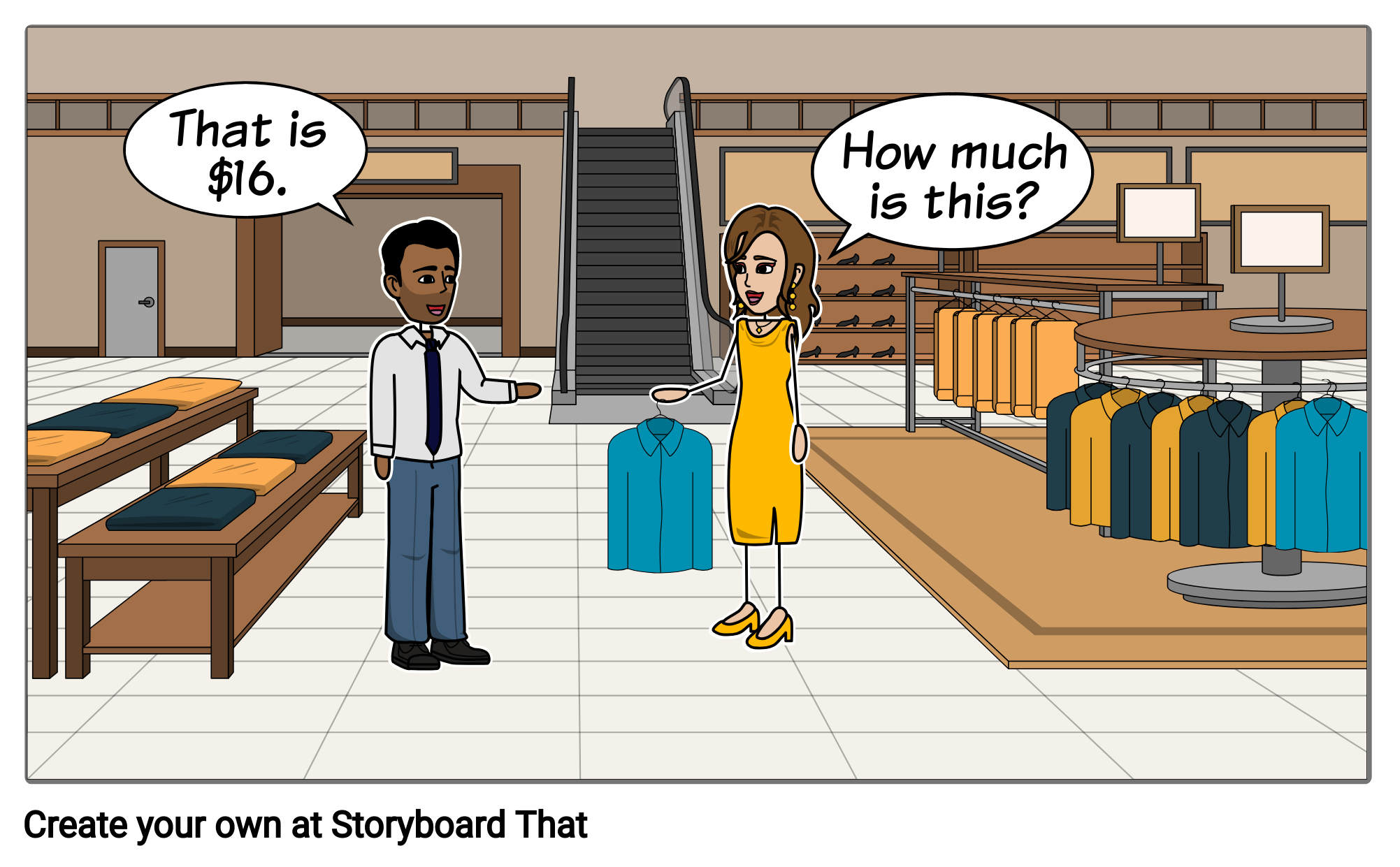
| 1. | How many people are there? |
| Answer: | |
| 2. | How much is the shirt? |
| Answer: |
PART B_3
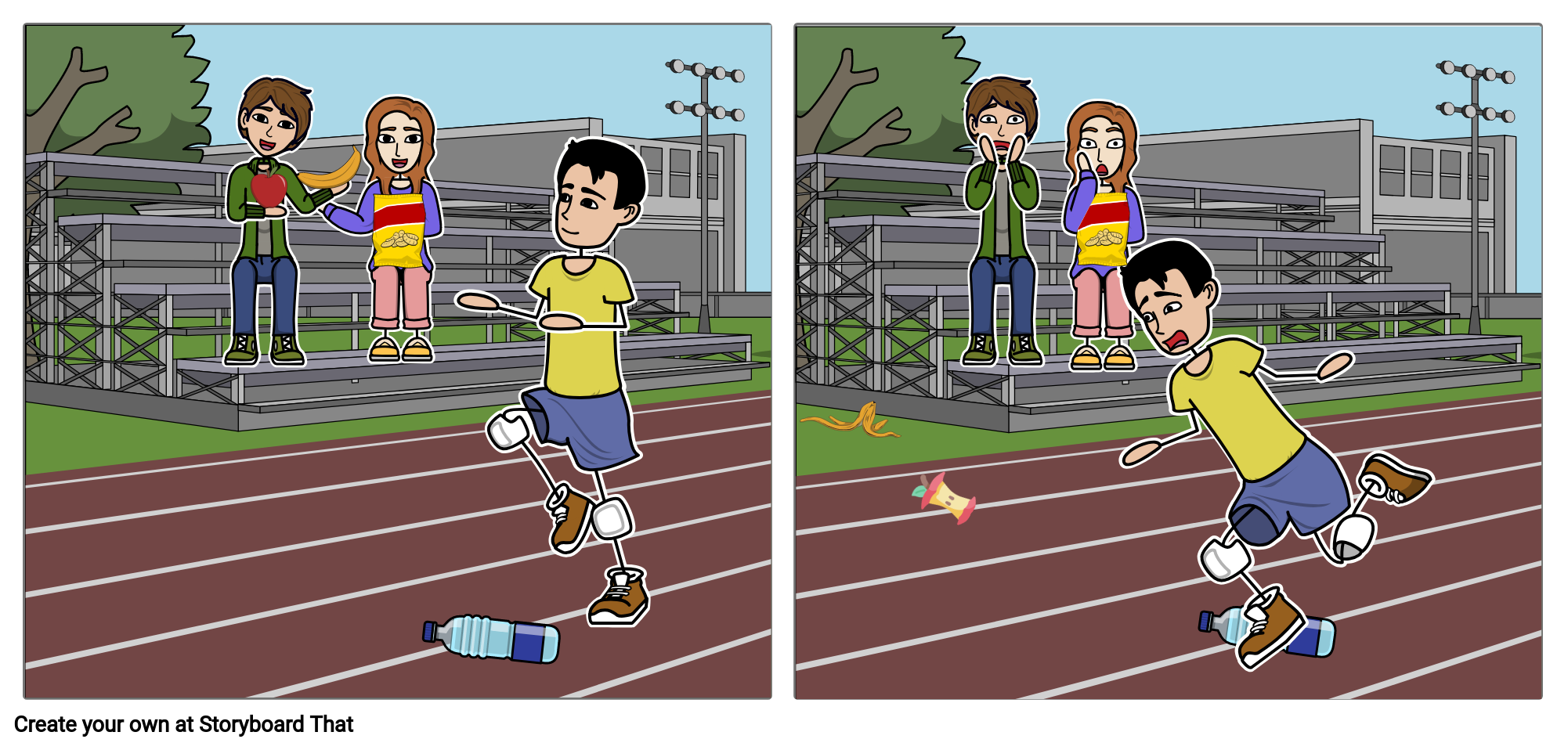
| 1. | Why are there trash on the floor? |
| Answer: | |
| 2. | What will happen to the athlete? |
| Answer: |
PART B_4
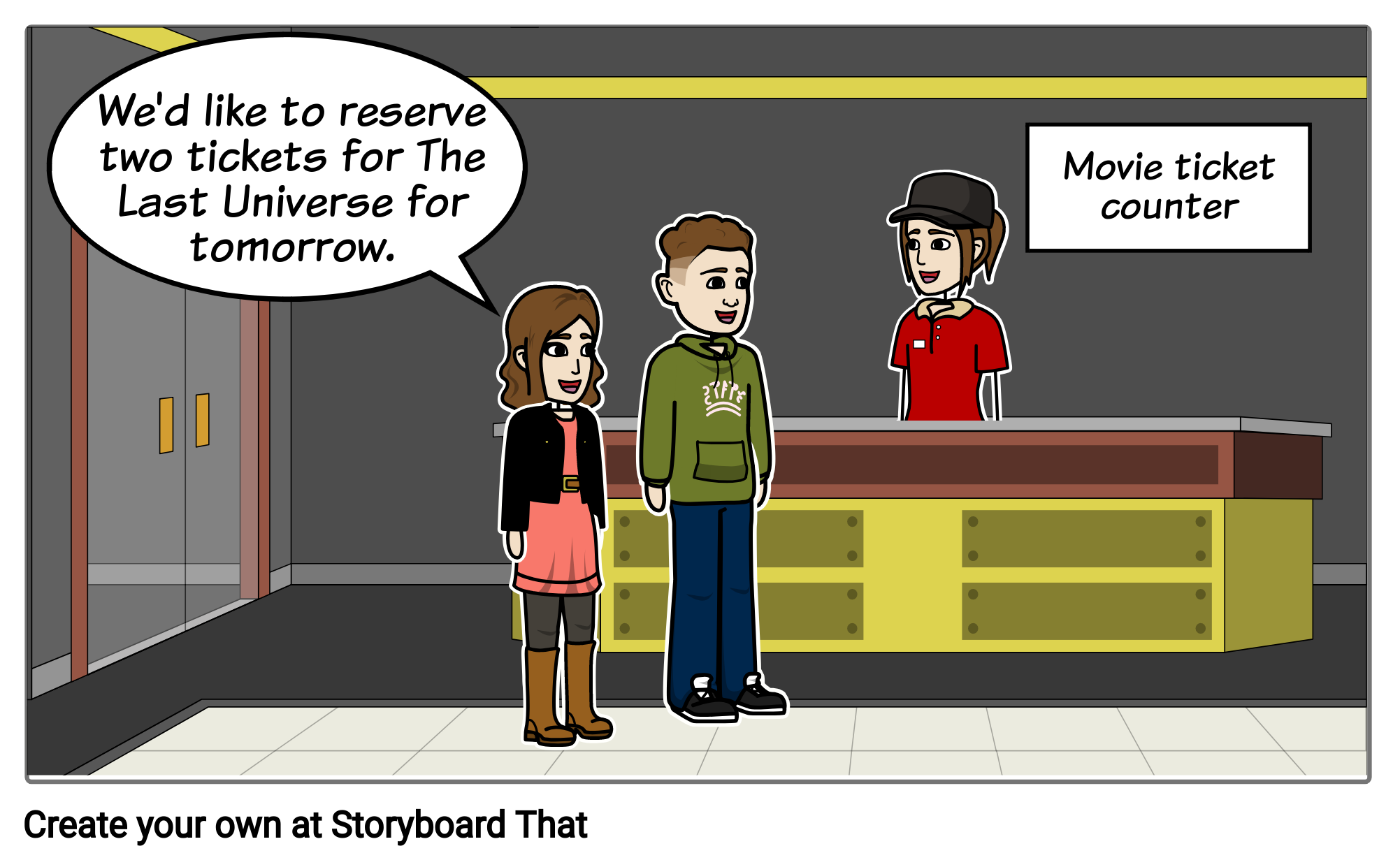
| 1. | How many movie tickets are they going to reserve? |
| Answer: | |
| 2. | What are they going to watch? |
| Answer: |
REVIEW AND FEEDBACK
Now, let us review the things that you learned in this lesson.
ではこのレッスンで学んだことを振り返りましょう。
(Please give a short feedback on how your student did on your class.)
| Grammar 文法 |
Pronunciation 発音 | Vocabulary 単語 |
Comprehension 理解 |
|
|---|---|---|---|---|
 GOOD GOOD |
文法の誤りはほとんどなく、完全な文章で話すことができる | ほとんどの単語をはっきりと正しく発音することができる | 習った表現を適切に使うことができる | 文章を理解し、質問に正しく答えることができる |
 FAIR |
文法の誤りはあるが、完全な文章で話すことができる | 発音の練習が必要な言葉がいくつかある | たまにミスはあるが、習った表現を適切に使うことができる | 文章を完全に理解するのは難しく、質問に正しく答えられないときもある |
 POOR |
文章で話すのは難しく、単語だけで話すことができる | 発音の練習が必要である | 習った単語と表現を少しだけ使うことができる | 文章を理解するのは難しく、質問に答えるのは難しい |
2 Grammar_training of basic verb Lesson 2
PART A_1
Let’s introduce ourselves to each other.
自己紹介をしましょう。
PART A_2
My name is ________________. What is your name?
PART A_3
I am ________________. Nice to meet you.
PART A_4
Nice to meet you too, ________________. What keeps you busy nowadays?
PART A_5
________________________________. How about you?
PART A_6
________________________________. Let’s begin our lesson!
PART B_1
We will read aloud the sentences below. Please repeat after me. I will check your pronunciation.
文章を音読します。講師に続いて読みましょう。講師は発音を確認します。
(Please send the mispronounced words and expressions to your student.)
PART B_2
|
1.
|
She got an A on her final exam. |
|
頑張って勉強して、その結果、A(優)を獲得したということ。
|
|
|
2.
|
It gets cold here around the beginning of October. |
|
暑い季節、涼しい季節、そして10月の初旬に寒い季節に変化する。
|
|
|
3.
|
I’ll get you a ticket for the concert. |
|
彼女がコンサートのチケットを欲しがっている。手に入れてあげるよという意味合い。
|
|
|
4.
|
Don’t get me wrong. |
|
「誤解しないで」という意味だが、受け取り方に RIGHT と WRONG があり、WRONG として受け取ることは×だということ。
|
|
|
5.
|
The rain is getting the curtains wet. |
|
乾いたカーテン。雨が降る。雨に濡れ、カーテンが濡れている。
|
|
|
6.
|
I’ll get the baby to sleep. |
|
起きている赤ん坊を寝ている状態にする。
|
PART B_3
Now, let’s review some words from part B_2.
ではいくつかの単語を復習してみましょう。
(Please review the mispronounced words and expressions from part B_2.)
PART B_4
PART C_1
Please fill in the blanks and read aloud the dialogue. I will check your pronunciation and intonation.
空欄を埋めて、会話文を読みましょう。講師が発音、イントネーションについて確認します。
PART C_2
|
TUTOR:
|
I’ll get you something to drink. Make yourself at home. |
|
STUDENT:
|
Thank you. Can I__________some beer? |
PART C_3
|
STUDENT:
|
Come on. Let’s__________started. |
|
TUTOR:
|
What’s the rush? |
PART C_4
|
TUTOR:
|
Get the phone, will you? |
|
STUDENT:
|
I’m busy. You__________it yourself. |
PART C_5
|
STUDENT:
|
I don’t__________it. |
|
TUTOR:
|
There’s no point. |
PART C_6
|
STUDENT:
|
__________well soon, OK? |
|
TUTOR
|
Thanks. I’m sure I’ll be all right in a couple of days. |
PART C_7
Now, let’s review your answers.
では、あなたの答えを復習してみましょう。その後、修正したあなたの答えを読んでみましょう。
(Please review your student’s answers by sending the correct answers in complete sentences. After that, ask your student to read aloud his or her corrected answers.)
PART C_8
PART D_1
We will read aloud the sentences below. Please repeat after me.I will check your pronunciation.
文章を音読します。講師に続いて読みましょう。講師は発音を確認します。
(Please send the mispronounced words and expressions to your student.)
PART D_2
| 1. | I got a phone call from Jason last night. |
| 2. | Got the picture. |
| 3. | I get such pleasure from teaching these kids. |
| 4. | Don’t get me wrong. |
| 5. | I still don’t get it. |
| 6. | What matters is getting the right results. |
PART D_3
Now, let’s review some words from part D_2.
ではいくつかの単語を復習してみましょう。
(Please review the mispronounced words and expressions from part D_2.)
PART D_4
PART E_1
Now, you will make 5 sentences by using the word you learned.
習った単語を使って文章を5つ作りましょう。
(Please send the sentences that need grammar corrections to your student.)
PART E_2
| word: | get | |
| 1. | . | |
| 2. | . | |
| 3. | . | |
| 4. | . | |
| 5. | . |
PART E_2
Now, let’s review your answers.
では、あなたの答えを復習してみましょう。その後、修正したあなたの答えを読んでみましょう。
(Please review your student’s answers by sending the correct answers in complete sentences. After that, ask your student to read aloud his or her corrected answers.)
PART E_3
PART F_1
Now, please answer the following questions. I will check if your sentences are complete and if the grammar is correct.
講師が質問しますので答えましょう。講師は文法と完全な文章であるかを確認します。
PART F_2
| 1. | Have you gotten an A on your exams before? |
| Answer: | |
| 2. | When does it get cold in Japan? |
| Answer: | |
| 3. | Do you always get the explanation of your teacher when he/she teaches in class? |
| Answer: | |
| 4. | Have you gotten a gift on your last birthday? |
| Answer: | |
| 5. | Do you get happy when you hang out with your friends? |
| Answer: |
PART F_3
Now, let’s review your answers.
では、あなたの答えを復習してみましょう。その後、修正したあなたの答えを読んでみましょう。
(Please review your student’s answers by sending the correct answers in complete sentences. After that, ask your student to read aloud his or her corrected answers.)
PART F_4
PART G_1
Let’s do a free talk.
フリートークをしましょう。
(Please do a free talk if you have time left.)
PART G_2
2 Grammar_training of basic verb Lesson (template)
PART A_1
Let’s introduce ourselves to each other.
自己紹介をしましょう。
PART A_2
My name is ________________. What is your name?
PART A_3
I am ________________. Nice to meet you.
PART A_4
Nice to meet you too, ________________.●?
PART A_5
________________________________. How about you?
PART A_6
________________________________. Let’s begin our lesson!
PART B_1
We will read aloud the sentences below. Please repeat after me. I will check your pronunciation.
文章を音読します。講師に続いて読みましょう。講師は発音を確認します。
(Please send the mispronounced words and expressions to your student.)
PART B_2
|
1.
|
● |
|
JP●
|
|
|
2.
|
● |
|
JP●
|
|
|
3.
|
● |
|
JP●
|
|
|
4.
|
● |
|
JP●
|
|
|
5.
|
● |
|
JP●
|
|
|
6.
|
● |
|
JP●
|
PART B_3
Now, let’s review some words from part B_2.
ではいくつかの単語を復習してみましょう。
(Please review the mispronounced words and expressions from part B_2.)
PART B_4
PART C_1
Please fill in the blanks and read aloud the dialogue. I will check your pronunciation and intonation.
空欄を埋めて、会話文を読みましょう。講師が発音、イントネーションについて確認します。
PART C_2
|
TUTOR:
|
● |
|
STUDENT:
|
● __________ |
PART C_3
|
TUTOR:
|
● |
|
STUDENT:
|
● __________ |
PART C_4
|
TUTOR:
|
● |
|
STUDENT:
|
● __________ |
PART C_5
|
TUTOR:
|
● |
|
STUDENT:
|
● __________ |
PART C_6
|
TUTOR:
|
● |
|
STUDENT:
|
● __________ |
PART C_7
Now, let’s review your answers.
では、あなたの答えを復習してみましょう。その後、修正したあなたの答えを読んでみましょう。
(Please review your student’s answers by sending the correct answers in complete sentences. After that, ask your student to read aloud his or her corrected answers.)
PART C_8
PART D_1
We will read aloud the sentences below. Please repeat after me.I will check your pronunciation.
文章を音読します。講師に続いて読みましょう。講師は発音を確認します。
(Please send the mispronounced words and expressions to your student.)
PART D_2
| 1. | ● |
| 2. | ● |
| 3. | ● |
| 4. | ● |
| 5. | ● |
| 6. | ● |
PART D_3
Now, let’s review some words from part D_2.
ではいくつかの単語を復習してみましょう。
(Please review the mispronounced words and expressions from part D_2.)
PART D_4
PART E_1
Now, you will make 5 sentences by using the word you learned.
習った単語を使って文章を5つ作りましょう。
(Please send the sentences that need grammar corrections to your student.)
PART E_2
| word: | ● | |
| 1. | . | |
| 2. | . | |
| 3. | . | |
| 4. | . | |
| 5. | . |
PART E_2
Now, let’s review your answers.
では、あなたの答えを復習してみましょう。その後、修正したあなたの答えを読んでみましょう。
(Please review your student’s answers by sending the correct answers in complete sentences. After that, ask your student to read aloud his or her corrected answers.)
PART E_3
PART F_1
Now, please answer the following questions. I will check if your sentences are complete and if the grammar is correct.
講師が質問しますので答えましょう。講師は文法と完全な文章であるかを確認します。
PART F_2
| 1. | ● |
| Answer: | |
| 2. | ● |
| Answer: | |
| 3. | ● |
| Answer: | |
| 4. | ● |
| Answer: | |
| 5. | ● |
| Answer: |
PART F_3
Now, let’s review your answers.
では、あなたの答えを復習してみましょう。その後、修正したあなたの答えを読んでみましょう。
(Please review your student’s answers by sending the correct answers in complete sentences. After that, ask your student to read aloud his or her corrected answers.)
PART F_4
PART G_1
Let’s do a free talk.
フリートークをしましょう。
(Please do a free talk if you have time left.)
PART G_2
2 Grammar_training of basic verb Lesson 1
PART A_1
Let’s introduce ourselves to each other.
自己紹介をしましょう。
PART A_2
My name is ________________. What is your name?
PART A_3
I am ________________. Nice to meet you.
PART A_4
Nice to meet you too, ________________. What do you do on weekend?
PART A_5
________________________________. How about you?
PART A_6
________________________________. Let’s begin our lesson!
PART B_1
We will read aloud the sentences below. Please repeat after me. I will check your pronunciation.
文章を音読します。講師に続いて読みましょう。講師は発音を確認します。
(Please send the mispronounced words and expressions to your student.)
PART B_2
|
1.
|
Let’s take a picture of the mountain. |
|
山に向かってシャッターを押すと、山のイメージが 写真機に取り込まれる。
|
|
|
2.
|
He took a ring from the store. |
|
泥棒が主人公なので指輪を自分のところに取り込めば、「盗む」という意味になる。
|
|
|
3.
|
Take me to the moon. |
|
誰かが私を手にして (take)、月まで移動するという感じ。
|
|
|
4.
|
Do you take the train to work? |
|
|
ride a train ならただ電車に乗るということ、catch a train であれば、電車を捕まえる(間に合う)という意味合いがあるが、take を使うと交通手段として選択するという意味合いが出てくる。
|
|
5.
|
Let me take your temperature. |
|
体温計を体に当てると、体温が数値として体温計に取り込まれる。take a picture の場合は、写真機にイメージが取り込まれる。
|
|
|
6.
|
It takes 3 hours to get there. |
|
「そこに到着すること」という行為が3時間を取り込む、ということから3時間を要する、という意味になる。
|
PART B_3
Now, let’s review some words from part B_2.
ではいくつかの単語を復習してみましょう。
(Please review the mispronounced words and expressions from part B_2.)
PART B_4
PART C_1
Please fill in the blanks and read aloud the dialogue. I will check your pronunciation and intonation.
空欄を埋めて、会話文を読みましょう。講師が発音、イントネーションについて確認します。
PART C_2
|
TUTOR:
|
Is John here? |
|
STUDENT:
|
No. He’s out right now. Shall I __________ a message for him? |
PART C_3
|
TUTOR:
|
What is the best way to get to Osaka from Tokyo? |
|
STUDENT:
|
__________ the plane is the quickest way. |
PART C_4
|
TUTOR:
|
Will this bus take me to the national museum? |
|
STUDENT:
|
Yes, it __________ about 15 minutes. I’ll let you know. |
PART C_5
|
TUTOR:
|
I’ll have this done in just a minute. |
|
STUDENT:
|
__________ your time. I’m not in a hurry. |
PART C_6
|
TUTOR:
|
This dress looks great on you. |
|
STUDENT:
|
Thank you. I’ll __________ it. |
PART C_7
Now, let’s review your answers.
では、あなたの答えを復習してみましょう。その後、修正したあなたの答えを読んでみましょう。
(Please review your student’s answers by sending the correct answers in complete sentences. After that, ask your student to read aloud his or her corrected answers.)
PART C_8
PART D_1
We will read aloud the sentences below. Please repeat after me.I will check your pronunciation.
文章を音読します。講師に続いて読みましょう。講師は発音を確認します。
(Please send the mispronounced words and expressions to your student.)
PART D_2
|
1.
|
Take me home, to the place I belong. |
|
2.
|
Hey, jude. Don’t make it bad. Take a sad song and make it better. |
|
3.
|
I won’t take no for an answer. |
|
4.
|
If you want to be taken seriously, you need to watch your language. |
|
5.
|
Shall we take a walk around the lake? |
|
6.
|
Don’t take too much sugar. |
PART D_3
Now, let’s review some words from part D_2.
ではいくつかの単語を復習してみましょう。
(Please review the mispronounced words and expressions from part D_2.)
PART D_4
PART E_1
Now, you will make 5 sentences by using the word you learned.
習った単語を使って文章を5つ作りましょう。
(Please send the sentences that need grammar corrections to your student.)
PART E_2
| word: | take | |
| 1. | . | |
| 2. | . | |
| 3. | . | |
| 4. | . | |
| 5. | . |
PART E_2
Now, let’s review your answers.
では、あなたの答えを復習してみましょう。その後、修正したあなたの答えを読んでみましょう。
(Please review your student’s answers by sending the correct answers in complete sentences. After that, ask your student to read aloud his or her corrected answers.)
PART E_3
PART F_1
Now, please answer the following questions. I will check if your sentences are complete and if the grammar is correct.
講師が質問しますので答えましょう。講師は文法と完全な文章であるかを確認します。
PART F_2
| 1. | Do you like taking pictures? |
| Answer: | |
| 2. | How long does it take you to get to your school? |
| Answer: | |
| 3. | Do you take your temperature everyday? |
| Answer: | |
| 4. | Do you take a bus to school? |
| Answer: | |
| 5. | Do you take notes during a class? |
| Answer: |
PART F_3
Now, let’s review your answers.
では、あなたの答えを復習してみましょう。その後、修正したあなたの答えを読んでみましょう。
(Please review your student’s answers by sending the correct answers in complete sentences. After that, ask your student to read aloud his or her corrected answers.)
PART F_4
PART G_1
Let’s do a free talk.
フリートークをしましょう。
(Please do a free talk if you have time left.)
PART G_2
レッスンのスマホ・タブレット受講機能をリリースしました
平素はWeblio英会話をご利用いただきありがとうございます。
本日より、一般のお客さま向けにスマートフォン・タブレットでの
レッスン受講を正式に提供開始いたします。
ご要望いただいていたお客さまには、長い間お待たせして大変申し訳ございませんでした。
以後のWeblio英会話の推奨環境は以下となります。
| OS | OSバージョン | 利用可能ブラウザ |
|---|---|---|
| Windows | Windows 8.1、Windows 10 以降 | GoogleChrome |
| MacOS | OS X Yosemite 10.10 以降 | GoogleChrome |
| Android | Android 5.0以降 | GoogleChrome |
| iOS | iOS 11以降 | Safari |
<通信回線>
下り速度・上り速度それぞれ5Mbps以上
※モバイル回線で接続される場合、ご利用時にかかるパケット通信料はお客さまのご負担となります。
<端末について>
・iPadについては、iOSと同様Safariにてご利用可能です。
・端末にマイク・スピーカー・カメラが内蔵してある場合そちらをご利用いただく事が可能です。
※OSやブラウザのバージョンが古い場合は正常に動作しない場合がございます。
最新版へのアップデートをお願いします。
※上記以外のご利用環境の場合、弊社サービスのサポート対象外となる可能性がございます。
あらかじめご了承くださいませ。
また、無料体験レッスンも1回ご受講いただけます。
ログイン後無料体験レッスンを受講できない場合や、今回改めて無料体験レッスンを受講したい方は
お気軽にお問い合わせくださいませ。
何かご不明な点がありましたら、お気軽にこちらからお問い合わせください。
今後ともWeblio英会話をどうぞよろしくお願いいたします。

